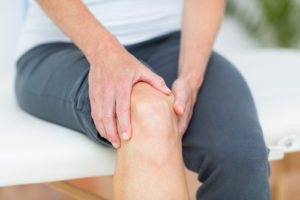“The ultimate authority must always rest with the individual’s own reason and critical analysis.” – Dalai Lama
 Too often we fall to the misguided notion that we must treat our pain first and then try to find out what is causing it. This is particularly true for athletes. We understand that, more often than not, athletes are more prone than most to joint and muscle injuries and pain.
Too often we fall to the misguided notion that we must treat our pain first and then try to find out what is causing it. This is particularly true for athletes. We understand that, more often than not, athletes are more prone than most to joint and muscle injuries and pain.
However, many people who are not athletic or even minimally active can suffer from joint and muscle pain. And the causes are numerous.
And how do most of us treat chronic knee pain? The main OTC medications most people use are acetaminophen and non-steroidal anti-inflammatory drugs, such as ibuprofen, naproxen, and aspirin. While these over-the-counter drugs can help with simple sprains or even arthritis, they only treat the most obvious symptoms.
Assessment and Diagnosis of Knee Pain
What is chronic knee pain?
Chronic knee pain is typically experienced by long-term pain, sensitivity, or swelling in one or both knees. While the cause of chronic knee pain can often determine the symptoms you experience, many types of conditions can either cause or contribute to chronic knee pain. In addition, everyone will experience chronic knee pain in different ways.
Knee pain is a common ailment that is evident in both athletes and sedentary people. Commons causes can include knee ligament injuries, bursitis, meniscal tears, patellar tendonitis, patellar dislocation and osteoarthritis in the knee.
However, the cause alone is not always the only contributing factor to chronic knee pain. According to an article at HealthLine “injuries to the structure of the knee can cause bleeding and swelling and can create a chronic problem over time if not treated properly.” In addition, they note the following factors:
- sprains and strains
- overuse
- infection
- bad posture and form when doing physical activity
- not warming up or cooling down before or after physical activity
- improperly stretching the muscles
Along with these issues, obesity and aging can contribute to chronic knee pain.
Traditional diagnosis of knee problems typically uses x-rays and a physical evaluation. A patient is assessed for pain level, knee flexibility and function, and general mobility. Doctors may also use specialized tests to find and identify any type of arthritis that may be a primary cause of knee pain.
At Pain and Performance Solutions we will diagnose knee pain by first getting your full medical history. Then we ask a series of questions to direct our diagnosis of your chronic knee pain. These questions will include:
- When did the knee pain start?
- What activities did you recently do?
- What have you done for your knee pain?
- Does the pain radiate or travel to other parts of your leg?
- Does anything you do reduce the pain or make it worse?
After completing our discovery questioning, we will obtain a full physical examination and an assessment of your body movement and then diagnose the cause of your knee pain.
Assessing Your Condition
A common approach is for us to perform a movement and structural assessment using both the Selective Functional Movement Assessment (SFMA) and Anatomy in Motion, or AiM®.
The SFMA is a series full-body movement tests that are relatively simple to do and provide a basis for a series of more complex tests that ultimately provide a path for treatment options.
Using Anatomy in Motion for a gait assessment then provides a complementary roadmap of the structure of your body. Combining gait analysis, hands on assessment, manual therapy, and corrective exercises, we can often provide significant improvement in your body’s movement mechanics.
This can often then lead to knee pain relief, as well as improved functionality of your knee joint.
Understanding your body’s functionality and dysfunctions provides us with the insights we need to develop a therapy approach best suited to treat the underlying causes of your knee pain.
Pain and Performance Solutions for Your Chronic Knee Pain
We can help you find the answer to your pain. By setting up your first appointment with us you can begin start by you telling us what your first injury was or when you first became aware of the pain. This information is critical and something we’ll explain when you come in. Don’t simply ignore your knee pain hoping it will just go away. Let us help. Contact us today at 707-636-4404 or book an appointment online to start your recovery process.